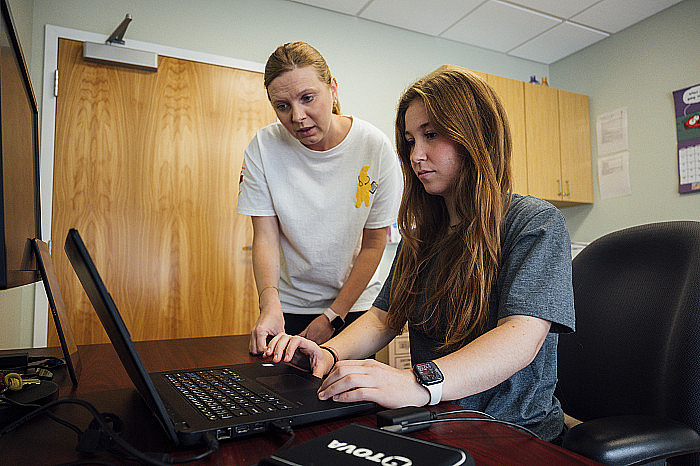Pushing for a New Understanding: Exploring the Correlation Between ADHD and Anxiety
Brooke Richards ’26, a neuroscience and biology major from Chambersburg, Pa., is researching the correlations between attention deficit hyperactivity disorder (ADHD) and anxiety under the direction of Assistant Professor of Health Sciences Nicole Ivaska as a part of Ursinus’s Summer Fellows Program
In recent years, there has been a significant focus on mental health across all aspects of life, leading to a stronger desire to comprehend the challenges affecting individuals in our society today. Some of the pursuit of this understanding is happening at Ursinus College.
Brooke Richards ’26, a neuroscience and biology major from Chambersburg, Pa., is researching the correlations between attention deficit hyperactivity disorder (ADHD) and anxiety under the direction of Assistant Professor of Health Sciences Nicole Ivaska as a part of Ursinus’s Summer Fellows Program.
Richards’s work is primarily centered around masking behaviors that can be caused by anxiety in people with ADHD and seeing how they match up with different types of variables, such as someone’s heart rate or self-reported and impulsivity diagnostics. A masking behavior is something somebody does to cover up different variables of not being able to pay attention like picking fingernails, playing with hair, fidgeting, and so much more.
For Richards, the idea to focus on a research topic such as this came from her own experiences with ADHD, along with the experiences of those around her.
“I actually struggle with ADHD myself and I’ve heard so many other students, especially higher-level students, who struggle as well,” explained Richards. “I’d love to figure out more about the correlations that exist and be able to help more people, so they don’t struggle as long.”
Participants in Richards’s research project were canvased from social media to come to Ursinus to participate in hour-long testing. After filling out normal demographic information, participants would complete the GAD-7 test, which was to self-report anxiety, and then they would do a test to self-report ADHD symptoms. That would be followed by participants taking a Test of Variables of Attention (TOVA©) on the computer, which is a 20-minute test on impulsivity and focus. Those results would lead to the data for Richards to analyze.
Richards hopes to see a correlation between having anxiety and self-reporting lower ADHD, which could change, or add more information to, how people diagnose ADHD. That change in diagnoses could be critical for many different reasons. One example could come from the difference in gender, where men and women present the disorder differently, which leads to fewer women getting diagnosed in the end.
“I think this research will allow us to see what we can do for students with ADHD or anxiety when it comes to things like testing or how they learn,” Richards said.
Richards began this research project at the beginning of last academic year and to continue to build out a lengthier study, she decided to pursue a Summer Fellows opportunity with Ivaska.
The increased research opportunity has also allowed her to really interact and learn the stories of those participating in the study.
“A lot of people share with me their struggles with ADHD, and it’s been a really great experience to hear other people talk about something I’ve struggled with as well,” Richards said.
